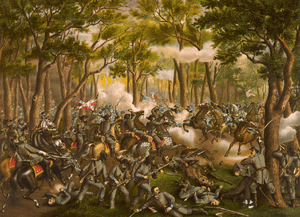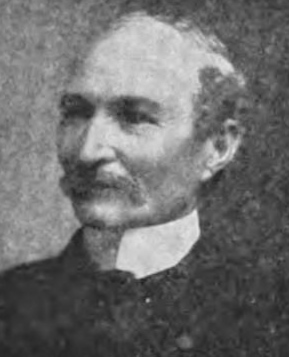Patrick H. Monaghan facts for kids
Quick facts for kids
Patrick Henry Monaghan
|
|
|---|---|

Corp. Patrick H. Monaghan, c. 1864
|
|
| Born | November 19, 1843 Belmullet, County Mayo, Ireland |
| Died | October 22, 1917 (aged 73) Girardville, Pennsylvania |
| Allegiance | |
| Service/ |
Pennsylvania National Guard, 1872–1884 U.S. Army (Union): 48th Pennsylvania Infantry, 1861–1865 |
| Rank | Lieutenant colonel (Pennsylvania National Guard) Sergeant (48th Pennsylvania Infantry) |
| Battles/wars | American Civil War
|
| Awards | |
Patrick Henry Monaghan (November 19, 1843 – October 22, 1917) was a native of Ireland who fought for the federal government of the United States (Union Army) during the American Civil War as a member of Company F of the 48th Pennsylvania Infantry. He received America's highest award for valor, the U.S. Medal of Honor, for recapturing the regimental flag of the 7th New York Heavy Artillery on June 17, 1864 while fighting in the Siege of Petersburg, Virginia.
Formative years
Born on November 19, 1843, Patrick H. Monaghan was a native of Belmullet, County Mayo, Ireland. In 1848, when he was five years old, Monaghan emigrated from Ireland and, after arriving in America, settled with his family in Schuylkill County, Pennsylvania. Educated initially in the public school in Minersville, Monaghan then went on to graduate from the Normal School.
Civil War
On August 12, 1861, Patrick H. Monaghan became one of the early responders to U.S. President Abraham Lincoln's call for volunteers to defend Washington, D.C. following the mid-April 1861 fall of Fort Sumter to the Confederate States Army. After enrolling for military service in the American Civil War, Monaghan officially mustered in as a private with Company F of the 48th Pennsylvania Infantry. Military records at the time described him as being an 18-year-old laborer and Schuylkill County, Pennsylvania resident who was 5’7” tall with light hair, blue eyes, and a light complexion.
Armed with Harper's Ferry muskets, Monaghan and his fellow 48th Pennsylvania Volunteers were trained in basic light infantry tactics before being shipped on September 24 to Baltimore, Maryland via the Northern Central Railroad, where they transferred to the steamship, Georgia. Transported to Fortress Monroe, they disembarked there on September 26, and resumed their training. After departing Fortress Monroe on November 11 via the steamship, S.R. Spaulding, they arrived at Hatteras Island in North Carolina the next day. Encamped in wooden barracks at Fort Clarke, Monaghan and his regiment continued to hone their skills via drills and inspections. During the early winter of 1862, they received their first exposure to combat when they participated in the capture of Roanoke Island (February 7–8, 1862). Monaghan then remained behind at their Hatteras encampment with his fellow F Company members, as well as those from Companies E and K, when the bulk of the regiment participated in operations related to the Battle of New Bern (March 14). They then reconnected with the main body of their regiment on May 23, which had been reassigned, on April 11, to the 1st Brigade of the division commanded by Brigadier-General Jesse L. Reno. At this juncture, they were then issued Enfield rifles. Moved back to Fortress Monroe in early June, they were then ordered to Newport News, Virginia where, on August 2, they sailed for Aquia Creek, and were transported from there two days later by rail to Fredericksburg, where they supported Union Army operation for roughly a week before being assigned to the Northern Virginia Campaign, during which they fought in the Battle of Cedar Mountain (August 9), engaged in operations at Kelly's Ford, White Sulphur Springs, Warrenton, and Manassas Junctions, and fought against the Confederate forces led by Stonewall Jackson in the Second Battle of Bull Run (August 28–30). According to historian Samuel P. Bates, Monaghan and his fellow 48th Pennsylvanians reached the battlefield at Bull Run at 1 p.m.
Re-engaging with the enemy the next day (August 30), the 48th Pennsylvanians experienced more intense combat during the Battle of Chantilly (September 1), during which the 48th Pennsylvania was again positioned at the far right of the Union Army. Ordered to Alexandria after the battle's conclusion, the regiment was reassigned to the Maryland Campaign (September 4–20). After fighting again near Fox's Pass in the Battle of South Mountain (September 14), Monaghan and the 48th Pennsylvania persevered through the brutality of the Battle of Antietam (September 17). Having engaged the enemy that morning at Burnside's Bridge, they then led the 1st Brigade in its pursuit of CSA troops through Sharpsburg and its surrounding bluffs while under heavy enemy artillery and rifle fire. Continuing to march and skirmish periodically with the enemy that fall, they then fought again in the Battle of Fredericksburg (December 11–15).
Still serving with the U.S. Army's 9th Corps during the opening months of 1863, Monaghan and the 48th Pennsylvania Infantry were transferred with their corps to duties in the west. Transported on March 26 from Newport News to Cincinnati, by way of Baltimore, Harrisburg and Pittsburgh, they spent less than 24 hours in the city on March 30 before moving on to their assigned provost duties in Lexington, Kentucky. A corporal by this point in his military career, he was subsequently attached to Battery M of the 3rd U.S. Artillery from September to December 1863, during which time he fought with the Army of the Potomac in the East Tennessee Campaign (also known as the Knoxville Campaign), including the Battle of Campbell's Station (November 16) and Siege of Knoxville.
On New Year's Day in 1864, Monaghan re-enlisted with the 48th Pennsylvania at Cincinnati, mustered in with Company F at the rank of sergeant, and was awarded a 30-day veteran's furlough.
Having returned to service with his regiment in February 1864, Monaghan joined his fellow 48th Pennsylvania Volunteers in their next phase of service. Attached to the 1st Brigade of the 2nd Division of the U.S. Army's 9th Corps, they were then assigned to the Overland Campaign led by Lieutenant-General Ulysses S. Grant. While re-engaging the enemy in the Battle of the Wilderness (May 5–7), Monaghan was wounded again. The 48th Pennsylvania was then even more heavily battered by the enemy during the Battle of Spotsylvania Court House (May 8–21), a fight in which the 48th “steadily maintained its position under a destructive fire of musketry and artillery, and captured two hundred prisoners” that morning, according to Bates, and charged the enemy that afternoon “under a galling fire” that felled multiple members of the regiment. After charging the enemy again on the 18th, they then skirmished off and on with Confederate troops in the vicinities of the North Anna and Pamunkey rivers and Totopotomoy Creek before fully re-engaging with the enemy during the Battle of Cold Harbor (June 3–12).
It was during his regiment's next phase of duty that Monaghan performed the act of valor for which he would later be awarded the U.S. Medal of Honor. In recalling the events later for author Theophilus F.
Involved with his regiment in the June and July preparations for the mine placement and explosion at Petersburg, but not the ensuing Battle of the Crater (July 30), Monaghan and his fellow 48th Pennsylvanians next fought with Confederates in the Battle of Poplar Springs Church (September 30–October 2), and were then reassigned to the occupation of Fort Sedgwick from early December 1864 through April 1, 1865. The next day, they participated in the Union's assault on Fort Mahone, and began the occupation of Petersburg (April 3), continuing in operations related to this action until their regiment was honorably mustered out on July 17, 1865.
Post-war life
Following his return to Pottsville, Pennsylvania with his regiment, Monaghan married Bridget Derrick circa 1870. A fellow County Mayo resident, she had emigrated circa 1849. Initially making their home in Minersville and then, by 1880, in Girardville, their children were: William J. (born c. 1871), Mary B. (born November 1874), Joseph P. (born January 1876), Margaret M. (born January 1879), Vincent (c. 1884–1920), who was born in July 1884, and Helen (born May 1886).
In addition, Monaghan enrolled for post-war service with the National Guard of Pennsylvania. After initially mustering in as a captain with the guard's 7th Regiment on July 24, 1872, he was recommissioned at the rank of major on August 5, 1879, and then recommissioned again as a lieutenant colonel on July 15, 1880. During his tenure of service, Monaghan and his subordinates were called upon to restore order in Shenandoah during the labor riots of 1875, provided police support for the 1876 Centennial Exposition in Philadelphia, and were then called upon to restore order again during the Great Railroad Strike of 1877. Initially stationed in Harrisburg in July of that year, they were then reassigned to Pittsburgh in August until they were relieved by another regiment of the Pennsylvania National Guard.
A naturalized citizen of the United States by the time of the 1900 federal census, Monaghan continued to reside in Girardville with his wife and children: Mary; Joseph, who was studying law; Margaret; Vincent, who had become a druggist's clerk; and Helen. That fall, he presented a lecture on the topic of “The Rank and File” during his former Civil War regiment's annual reunion in Pottsville. He then also attended the group's reunion in 1905, and was photographed wearing his MoH at a Girardville Veteran's reunion in 1913.
Still residing together with his wife and all of his surviving children by 1910, Monaghan continued to serve his community, as did sons William J. and Vincent D., who had become, respectively, a doctor and pharmacist.
Death and interment
Monaghan died in Girardville, Pennsylvania on October 22, 1917, and was buried at Saint Joseph's Cemetery in Girardville.
See also
- Infantry Tactics
- Irish Americans in the American Civil War
- List of American Civil War Medal of Honor recipients: M–P
- Pennsylvania in the American Civil War




